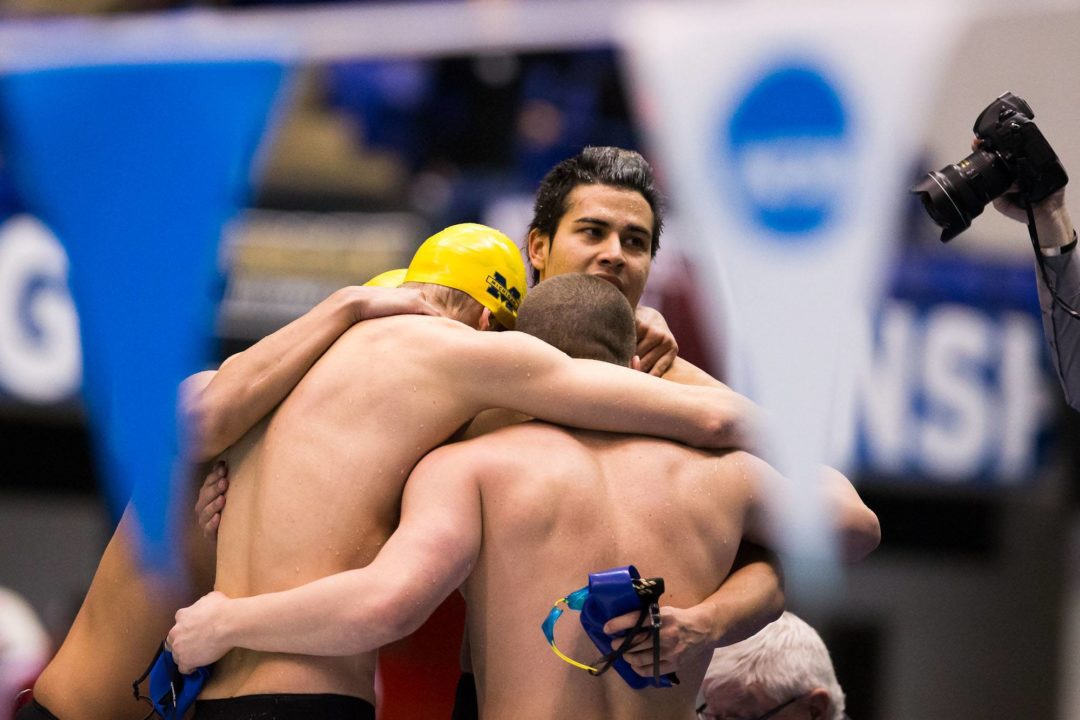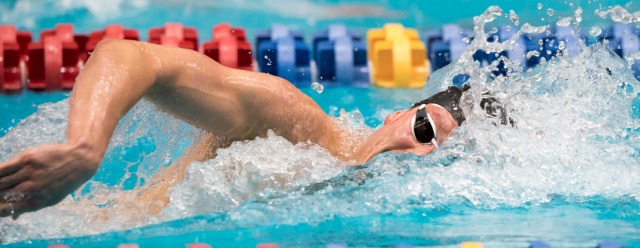Contributor, Rick Paine, is a friend and an expert on the college recruiting process. He is also the Director of Swimming at American College Connection.
Editor Note: This is an updated version from a 2012 post. With recruiting season in full swing, we felt Rick Paine’s editorial might be helpful.
As you are probably finding out, the college recruiting process can be very complicated. Here is an example of the type of advice that we provide for our swimmers and their parents.
College coaches base a lot of their recruiting on a swimmer’s potential. Any good coach wants to believe they are recruiting a swimmer who they can help get faster. They are all looking for swimmers who are “headed in the right direction.”
So how do you present your potential to college coaches? The first step is for you and your coach to come up with some specific goals for the current season. The next step is for you to let the college coaches know what your goals are. This is not as easy as just telling them. You have to be subtle and believable.
You need to determine what you need to do differently in practice in order to achieve your goals. What are you willing to commit to? You can’t realistically set a goal without having a plan of attack. Those are called “dreams.”
Sample conversation between a swimmer and a college coach:
Swimmer: Coach, it seems like you and the team reached most of the goals for the season.
Coach: Yes, we had a really good year. The kids trained well and we hit 82% of our goals.
Swimmer: Congratulations. My coach and I got together the other day and set my goals for the season. Would you like to hear them?
Coach: Of course
Swimmer: I will go a :50 point or faster in my 100 free by August 5. I know I can at least swim that fast because I am doing dryland 3 days a week instead of 2 and I know I am getting stronger and that will really help me take my first 50 out in :24. I will also be able to kick 20 x 100- free on a 1:15 interval by July 15. With my legs in better shape I will be able to bring it home in at least :26.
What you just did is to make this coach look at you as a :50 point 100 freestyler instead of a :52.5.
That’s selling your potential.



Or as someone smarter than me said, “Don’t take your kid to the BMW dealership if you can only afford a Chevy.” 🙂
There a lot of good Chevys out there.
If a kid talked like that, wouldn’t a coach know that his parents simply scripted it for them? We are going through this process right now and we hope we are doing it right by giving our daughter a few big tips: First, be honest with these coaches and be yourself. Second, remember that in college these coaches have been hired to build winning programs. It’s their job to recruit the best talent for the lowest price. Third, all big D1 swimming schools will offer a dedicated student athlete a great education so don’t focus on pretty trees, cool architecture and the superficial. It’s about finding the right fit. Fourth, there are certain things you can’t control so don’t worry… Read more »
Geoff you seem to be right on with your approach. I would add that the swimmer has to make it his/her decision and if pretty trees and architecture are part of the decision so be it. About the only place the parent has a say is with regard to cost. At the start of the process (junior year) figure out a budget, communicate that to the swimmer, and do your best to stick to it. Coaches will try to get a swimmer for the lowest offer, totally understandable as this is business, but if if doesn’t fit the family budget, respectfully let the coach know and move on if necessary. There are dozens of great programs at all levels of… Read more »
I can tell you college coaches do look for athlete who have the greatest potential to improve during their college years. The 12 and under that Is pushed to extremes based on excessive training loads or constant pressure by their “support system” is at great risk of burn out. A good college coach will do the research about a swimmers background and potential before they make an investment or offer a spot on their team.
Here’s the order in my opinion: learn to love swimming, love racing, build a relationship with the water, kick faster, master technique, improve another stroke, be a better team swimmer, and finally-add a little more to the training load– repeat the cycle at least… Read more »
It is coaches job to push – but it is parents’ responsibility to pull back. Unfortunately most of parents do not know what they are doing. Fundamentals and patience are THE most important components in young swimmers development, and very few parents know about that. Our son starts with 4 practices in September and October, I then increase that to 4.5 (on average) in Nov and December, and to 5 January and February (never 6 per week). He improves all year and he peaks in March at the State AG champs. At last state AG champs he swam in 9 finals and never finished lower than 5th. He was fresh and very happy with constant and steady improvements all year.… Read more »
Amen David, if a child loves swimming, they’ll do whatever it takes to succeed through High School and ultimately College.
Erik Vendt and Larsen Jensen did 100s on the 1:20 all day…
from experience, i don’t know anyone who swims a 50 point in their 100 free who can also consistently turn 1:10 for a 100 flutter kick
I don’t know anybody that can kick 20×100 freestyle on the 1:15….even sub 45 sec 100 yard freestylers.
It’s not going to be your sub-45 100 freestylers who do that though, it’s goin to be the really strong milers and 500 freestylers whose legs are fast, but with endurance to keep 50 on 1:15.
I averaged 1:15 for a 2000 breast kick. I don’t think 20X100 on the 1:15 free kick is all that outrageous.
I see so much competition in the 12U age groups for state-meet time standards, Zone cuts, etc. So much that parents are pushing teams to let their 10yo train with the highest training groups. And it works – these kids get faster and faster. But my question is, don’t many (especially girls) peak early? And if the goal is to swim in college, do college coaches notice when swimmers have already peaked and then can’t hit their times when they are 17 and 18, right before college? Are the college coaches noticing that?
I think USA Swimming teams need to educate parents on swimmer development. But with the state and zone standards getting faster and faster every year, there… Read more »
Pushing kids at a very early age is a joke…. AG Coaches are trying to make a career on the young backs of developing children… I find it sickening…
Hi Swimparent, you ask some very good questions. It is pretty tough to determine when a swimmer has reached their peak. There are so many factors that go into peak performance not the least of which is having fun and enjoying the sport and the competition or racing. I see a lot of swimmers who continue to improve and actually peak in college not necessarily because of better coaching, but a different environment. There are a lot of female swimmers who continue to improve in college and well past.
I believe many swimmers stop improving because the work it takes to continue to improve is not worth the success it brings. In other words, they stopped having fun. College swimming… Read more »